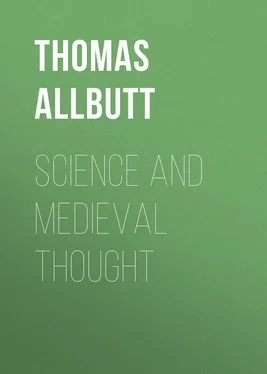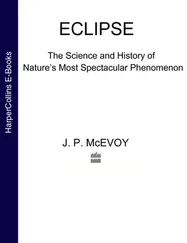Thomas Allbutt - Science and Medieval Thought
Здесь есть возможность читать онлайн «Thomas Allbutt - Science and Medieval Thought» — ознакомительный отрывок электронной книги совершенно бесплатно, а после прочтения отрывка купить полную версию. В некоторых случаях можно слушать аудио, скачать через торрент в формате fb2 и присутствует краткое содержание. Жанр: foreign_antique, foreign_prose, на английском языке. Описание произведения, (предисловие) а так же отзывы посетителей доступны на портале библиотеки ЛибКат.
- Название:Science and Medieval Thought
- Автор:
- Жанр:
- Год:неизвестен
- ISBN:нет данных
- Рейтинг книги:4 / 5. Голосов: 1
-
Избранное:Добавить в избранное
- Отзывы:
-
Ваша оценка:
- 80
- 1
- 2
- 3
- 4
- 5
Science and Medieval Thought: краткое содержание, описание и аннотация
Предлагаем к чтению аннотацию, описание, краткое содержание или предисловие (зависит от того, что написал сам автор книги «Science and Medieval Thought»). Если вы не нашли необходимую информацию о книге — напишите в комментариях, мы постараемся отыскать её.
Science and Medieval Thought — читать онлайн ознакомительный отрывок
Ниже представлен текст книги, разбитый по страницам. Система сохранения места последней прочитанной страницы, позволяет с удобством читать онлайн бесплатно книгу «Science and Medieval Thought», без необходимости каждый раз заново искать на чём Вы остановились. Поставьте закладку, и сможете в любой момент перейти на страницу, на которой закончили чтение.
Интервал:
Закладка:
Porphyry of Tyre, who lived in the 3rd century, may be called the founder of both Arabian and Christian scholastics. He was an Alexandrian, but of peripatetic rather than platonic opinions. In the Isagoge, or Introduction to the Categories, already mentioned as translated by Boetius about 500 a. d., he set forth plainly a problem which during the Middle Ages rent Western Europe asunder; a problem which, says John of Salisbury 10 10 Modern French historians do us the honour of annexing our heroes; in respect of the scholars of the Middle Ages M. Charles Jourdain has set, or followed, this example. John of Salisbury, that charming child of renascence, born out of due time, was first claimed as a Frenchman; then, as this “provenance” becomes untenable, he, and others, are called “Anglo-French.” The University of Paris in the XIIth century was no more France than Rome was Italy. In our sedentary arable life we do not realise the nomad habits of our forefathers. Edward the First would inhabit six distant castles in less than as many weeks; indeed Great Britain itself was then no island. The heroes, nay the armies, of Froissart’s Story fly about the world in their seasons like migrating birds. All keen scholars of the West went to the University of Paris, the daughter of kings and popes, and the intellectual centre not of a strip of kingdom between Anjou and the Empire, but of Europe itself. And of the scholars of Paris, Englishmen were, we hear, the most turbulent, but the boldest in argument and the most greedy of learning; this last character perhaps it is that now-a-days looks least English. Kuno Fischer admires the procession of great Englishmen down the highway of medieval thought, from Erigena to Francis Bacon. John was born at Salisbury, spent thirteen of his early years at the University of Paris, the best of them in the stormy service of Thomas Becket, and but the last five as Bishop of Chartres. We do not call Lanfranc an Englishman, nor even Adrian the Fourth an Italian.
, engaged more of the time and passions of men than for the house of Cæsar to conquer and govern the world; one indeed which even in our day and country is not wholly resolved.
The controversy lay between the Realists 11 11 The name Realism has been improperly used – improperly because previously engaged – to signify the conception of an objective world, from the play of which our impressions arise, and of which our impressions are, if not likenesses, at any rate symbols, as opposed to the name “Idealism” which, with a like violence, has been turned to signify the conception that the universe of things is but a picture produced by the evolution of the phenomena of consciousness. The proper names for these opposite conceptions are of course Noumenalism and Phenomenalism. Realism proper as a habit of thought, whatever may have been its provisional uses, is now a mischievous habit; noumenalism is a harmless amusement.
and the Nominalists; and the issues of it, in the eleventh century, – at which time the “Dark Ages” passed into the earlier of the two periods of the Middle Ages, – were formulated on the realist side by William of Champeaux, while the Breton Rousselin, or Roscellinus, had the perilous honour of defining them on behalf of the nominalists 12 12 Roscellinus, the Roger Bacon of the eleventh century, learned, rebellious, lucid and heroic, withstood the Church for philosophy as did Bacon in the thirteenth for natural science. It would seem that in heroism at any rate Abélard was below his master.
. To see the depth of the difference we must step back a little, to a time when metaphysics and psychology were not distinguished from other spheres of science 13 13 Vid. p. 50.
, and all research had for its object the nature of being. Plato himself held ideas not as mere abstractions but in some degree as creative powers; and we shall see how potent this function became in the thought of the Middle Ages when, in the ardour of research into the nature of being, the modes of individuating principles were distinguished or contrasted with an ingenuity incomprehensible to Plato or Aristotle, or at any rate undesired by these greater thinkers. Aristotle avoided the question whether form or matter individuate; he held that there is no form and no matter extrinsic to the individual. But by the medieval realist every particular, every thing, was regarded as after some fashion the product of universal matter and individual form. Now “form” might be regarded, and severally was regarded, as a shaping, determinative force or principle, pattern type or mould, having real existence apart from stuff, or, on the other hand, as an abstract principle or pattern having no existence but as a conception of the mind of the observer. The realists roundly asserted that form is as actual as matter, and that things arise by their participation – without whiteness no white thing, without humanity no man; and not individuals only: for the realist, out-platonising Plato, genera and species also had their forms, either pre-existent (“universalia ante rem”), or continuously evolved in the several acts of creation (“universalia in re”). Indeed for the extreme realist every “predicamental modality” was “aliquid ens separatum”; for instance, the soul, the active intellect, the passive intellect, and so on: conversely, by fusing idea with will, for other philosophers realism would get pushed back into efficient reason or divine will, and almost vanish 14 14 The opponents of the theory of the Mass are apt to charge the Roman Church with the proposition that therein the elements are changed into “real” flesh and blood. In the nineteenth century, as in the thirteenth, this Church has not, I believe, determined whether the “real” substance be corporeal or incorporeal, separable or inseparable from the sensible properties of things; whether in a word it be something or, as many of us would say, nothing at all. Spinoza regarded “substance” as intelligent and extended.
. By this latter route the Sorbonne, originally opposed to the Thomists, became nominalist after all; as did those once pious realists the Augustinians and Cistercians. Setting aside then the extreme nominalists, who would have dissolved thought by declaring all creatures to be so individual as to be incomparable, – “pulverising existence into detached particulars,” as some one has put it – and that names of kinds are mere nouns, or indeed mere air (“flatus vocis”), the prevalent nominalists were content to deny to ideas, forms, principles, or abstractions any other existence than as functions of the human mind – as subjective conceptions. For Ockham, says Hauréau, an idea was but a modality of the thinking subject. Abstractions then for these thinkers were but mental machinery for analysis of the concrete. Aristotle was as obscure and inconsistent in his language herein, and often elsewhere, as he was profound and scrupulous; but when his works came to be studied as a whole, and in the original tongue, the influence of his method, rather than the close consistency of his language, told against realism: virtually he was a conceptualist, and he found reality, where Plato denied it, in the particular object of sense 15 15 Thus it was difficult to claim his authority for one side or the other. The metaphysical treatises were not known till the later part of the twelfth century. (See p. 75, note 2.) At the outset of the Physics Aristotle discusses what nature is in itself, and defines first elements; in the Second Analytics on the other hand, although thinking of science as deductive and expository, he strongly opposes the primary existence of ideas, though these are predicable of many individuals. By excess of logical formations, the division of properties, the use of such terms as “γένη ὑποκείμενα,” &c. &c., he laid himself open to misconception, and so was readily platonised by his commentators. It would seem indeed that for Aristotle universals were not merely propositions obtained by negation of individual variations, but something more active. A νόησις became somehow a ποίησις; e.g. “ἡ δημιουργήσασα φύσις.” His position may be appreciated briefly thus: – In the Categories Aristotle speaks of individuals as primarily existent, while in Met. z, and elsewhere, the primary existent is the form. The inconsistency is, however, more apparent than real; for in the Categories it is the individual so far as he represents his natural kind which is primarily existent, whilst the form which in the Metaphysics is primarily existent occurs only in the individual. This terse appreciation is one of my many debts to Dr Jackson.
.
Интервал:
Закладка:
Похожие книги на «Science and Medieval Thought»
Представляем Вашему вниманию похожие книги на «Science and Medieval Thought» списком для выбора. Мы отобрали схожую по названию и смыслу литературу в надежде предоставить читателям больше вариантов отыскать новые, интересные, ещё непрочитанные произведения.
Обсуждение, отзывы о книге «Science and Medieval Thought» и просто собственные мнения читателей. Оставьте ваши комментарии, напишите, что Вы думаете о произведении, его смысле или главных героях. Укажите что конкретно понравилось, а что нет, и почему Вы так считаете.












